 W
WAn Appeal to all that Doubt or Disbelieve the Truths of the Gospel, whether they be Deists, Arians, Socinians, or nominal Christians, or short An Appeal was written by William Law in 1742. Law lived in the Age of Enlightenment centering on reason in which there were controversies between Catholics and Protestants, Deists, Socinians, Arians etc. which caused conflicts that worried him. The Appeal was heavily influenced by the works of the seventeenth-century German philosopher, Lutheran theologian and mystic writer Jakob Boehme.
 W
WAnimal Theology is a 1994 book by the ethicist and theologian Andrew Linzey, that examines the treatment and status of animals from a theological perspective. In the book, Linzey reconsiders what Christians see to be God's original plan for humanity's ruling of nature. He argues against previous conceptions of this connection which have been used to justify animal cruelty, instead claiming that such a relationship instead implies that the mission laid out by God is a model of generosity towards the oppressed and vulnerable, which is applicable to both humans and other animals.
 W
WJames Hal Cone (1938–2018) was an American theologian, best known for his advocacy of black theology and black liberation theology. His 1969 book Black Theology and Black Power provided a new way to comprehensively define the distinctiveness of theology in the black church. His message was that Black Power, defined as black people asserting the humanity that white supremacy denied, was the gospel in America. Jesus came to liberate the oppressed, advocating the same thing as Black Power. He argued that white American churches preached a gospel based on white supremacy, antithetical to the gospel of Jesus. Cone's work was influential from the time of the book's publication, and his work remains influential today. His work has been both used and critiqued inside and outside the African-American theological community. He was the Charles Augustus Briggs Distinguished Professor of Systematic Theology at Union Theological Seminary until his death.
 W
WJames Hal Cone (1938–2018) was an American theologian, best known for his advocacy of black theology and black liberation theology. His 1969 book Black Theology and Black Power provided a new way to comprehensively define the distinctiveness of theology in the black church. His message was that Black Power, defined as black people asserting the humanity that white supremacy denied, was the gospel in America. Jesus came to liberate the oppressed, advocating the same thing as Black Power. He argued that white American churches preached a gospel based on white supremacy, antithetical to the gospel of Jesus. Cone's work was influential from the time of the book's publication, and his work remains influential today. His work has been both used and critiqued inside and outside the African-American theological community. He was the Charles Augustus Briggs Distinguished Professor of Systematic Theology at Union Theological Seminary until his death.
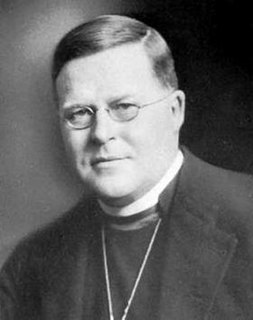 W
WWilliam Temple was an English Anglican priest, who served as Bishop of Manchester (1921–1929), Archbishop of York (1929–1942) and Archbishop of Canterbury (1942–1944).
 W
WChristology: A Biblical, Historical, and Systematic Study of Jesus is a 2009 theological book by the Australian Jesuit priest and academic Gerald O'Collins. This work was originally published in 1995 with the title Christology: A Biblical, Historical, and Systematic Study of Jesus Christ, but the author thoroughly revised the whole text in 2009 to take account of the numerous biblical, historical, and systematic studies of Jesus that appeared following its first edition.
 W
WChurch Dogmatics is the four-volume theological summa and magnum opus of Swiss Protestant theologian Karl Barth, and was published in twelve part-volumes from 1932 to 1967. The fourth volume of the Church Dogmatics (CD) is unfinished, and only a fragment of the final part-volume was published, and the remaining lecture notes were published posthumously. The planned fifth volume was never written.
 W
WOn the city of God against the pagans, often called The City of God, is a book of Christian philosophy written in Latin by Augustine of Hippo in the early 5th century AD. The book was in response to allegations that Christianity brought about the decline of Rome and is considered one of Augustine's most important works, standing alongside The Confessions, The Enchiridion, On Christian Doctrine, and On the Trinity. As a work of one of the most influential Church Fathers, The City of God is a cornerstone of Western thought, expounding on many profound questions of theology, such as the suffering of the righteous, the existence of evil, the conflict between free will and divine omniscience, and the doctrine of original sin.
 W
WPaul Johannes Tillich was a German-American Christian existentialist philosopher and Lutheran Protestant theologian who is widely regarded as one of the most influential theologians of the twentieth century. Tillich taught at a number of universities in Germany before immigrating to the United States in 1933, where he taught at Union Theological Seminary, Harvard Divinity School, and the University of Chicago.
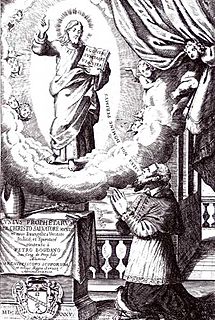 W
WCuneus Prophetarum is a philosophical, theological and scientific treatise written by Pjetër Bogdani, an Albanian philosopher, originally published in Padua in 1685 in Albanian and Latin. It is considered to be the most prominent work of early Albanian literature.
 W
WCur Deus Homo?, usually translated Why God Became a Man, is a book written by St Anselm of Canterbury in the period of 1094–1098. In this work he proposes the satisfaction view of the atonement.
 W
WDe doctrina Christiana is a theological text written by Augustine of Hippo. It consists of four books that describe how to interpret and teach the Scriptures. The first three of these books were published in 397 and the fourth added in 426. By writing this text, Augustine set three tasks for Christian teachers and preachers: to discover the truth in the contents of the Scriptures, to teach the truth from the Scriptures, and to defend scriptural truth when it was attacked.
 W
WDe Doctrina Christiana is a theological treatise of the English poet and thinker John Milton (1608–1674), containing a systematic exposition of his religious views. The Latin manuscript “De Doctrina” was found in 1823 and published in 1825. The authorship of the work is debatable. In favor of the theory of the non-authenticity of the text, comments are made both over its content, as well as since it is hard to imagine that such a complex text could be written by a blind person However, after nearly a century of interdisciplinary research, it is generally accepted that the manuscript belongs to Milton. The course of work on the manuscript, its fate after the death of the author, and the reasons for which it was not published during his lifetime are well established. The most common nowadays point of view on De Doctrina Christiana is to consider it as a theological commentary on poems.
 W
WThe Dialogue with Trypho, along with the First and Second Apologies, is a second-century Christian apologetic text, usually agreed to be dated in between AD 155-160. It is seen as documenting the attempts by theologian Justin Martyr to show that Christianity is the new law for all men, and to prove from Scripture that Jesus is the Jewish Messiah.
 W
WDisappointment with God: Three Questions No One Asks Aloud is a book written by Philip Yancey and published by Zondervan in 1988. It is one of Yancey's early bestsellers. Library Journal reviewer Elise Chase called the book "extraordinarily empathetic and persuasive; highly recommended". Mark DeVries of The Christian Century reviewed the book and wrote that, through the book, Yancey "cuts through the pollyannaish denials that so often characterize evangelical treatment of unbelief, disappointment and unanswered prayer". The Christian Bookstore Journal listed Disappointment with God as the fifth-bestselling Christian book in 1989. In a 1991 Ministry review, Daniel Guild calls the book "Yancey at his superlative best". In 2000, Jim Remsen of The Philadelphia Inquirer called the title of the book evocative. A 2001 article in U.S. Catholic states that Disappointment with God demonstrates Yancey's willingness to address difficult questions. In 2002, Mike Collins of the Charleston Gazette-Mail recommended the book for rape victims. In 2005, Christian apologist William Lane Craig wrote that he "enjoyed reading Disappointment with God and found much of it to be meaningful and poignant", but that he disagreed with the thesis of the book. Hong Kong film director Clement Cheng read the book and called it thought-provoking.
 W
WThe Divine Legation of Moses is the best-known work of William Warburton, an English theologian of the 18th century who became bishop of Gloucester. As its full title makes clear, it is a conservative defence of orthodox Christian belief against deism, by means of an apparent paradox: the afterlife is not mentioned in terms in the Pentateuch, making Mosaic Judaism distinctive among ancient religions; from which, Warburton argues, it is seen that Moses received a divine revelation.
 W
WPaul Johannes Tillich was a German-American Christian existentialist philosopher and Lutheran Protestant theologian who is widely regarded as one of the most influential theologians of the twentieth century. Tillich taught at a number of universities in Germany before immigrating to the United States in 1933, where he taught at Union Theological Seminary, Harvard Divinity School, and the University of Chicago.
 W
WThe Elephant in the Dark is a book by the writer Idries Shah, based on lectures he delivered at the University of Geneva as Visiting Professor in 1972–1973. He was invited to speak on the topic of “Salvation as a total surrender to God: an attempt at dialogue between Christians and Muslims.”
 W
WElucidarium is an encyclopedic work or summa about medieval Christian theology and folk belief, originally written in the late 11th century by Honorius Augustodunensis, influenced by Anselm of Canterbury and John Scotus Eriugena. It was probably complete by 1098, as the latest work by Anselm that finds mention is Cur deus homo. This suggests that it is the earliest work by Honorius, written when he was a young man. It was intended as a handbook for the lower and less educated clergy. Valerie Flint (1975) associates its compilation with the 11th-century Reform of English monasticism.
 W
WThe Evangelical Dictionary of Theology is a Christian reference work published by Baker Books. It was first published in 1984, with a second edition appearing in 2001. The general editor is Walter A. Elwell. It was a successor to Baker's Dictionary of Theology. John Jefferson Davis describes it as a "first-class piece of evangelical scholarship", while David Dockery calls it an "outstanding contribution to the fields of biblical, historical and systematic theology."
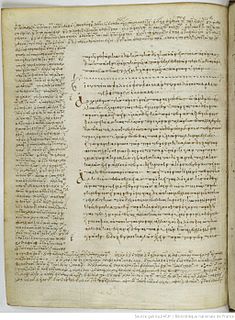 W
WThe Exhortation to the Greeks is an Ancient Greek Christian paraenetic or protreptic text in thirty-eight chapters.
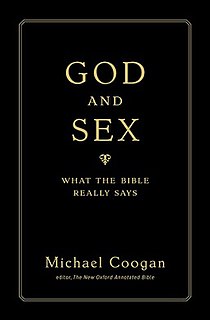 W
WGod and Sex: What the Bible Really Says is a book by Michael Coogan, published in 2010.
 W
WArthur Michael Ramsey, Baron Ramsey of Canterbury, was an English Anglican bishop and life peer. He served as the 100th Archbishop of Canterbury. He was appointed on 31 May 1961 and held the office until 1974, having previously been appointed Bishop of Durham in 1952 and the Archbishop of York in 1956.
 W
WThe Great House Of God: A Home for Your Heart is a Christian religious book written by Max Lucado and published by Word Publishing in 1997. Terry Burns of the Pembroke Daily Observer called The Great House of God "an excellent book on the Lord's Prayer". The Christian Science Monitor listed The Great House of God fifth on its quarterly list of hardcover religion bestsellers in December 1997. In a Publishers Weekly review, Henry Carrigan writes that, although the thoughts in the book "might be powerful in their spoken form, the brevity and the shallowness of their written form abandons readers in the foyer". In a Booklist article, Ray Olson compares the book to Philip Yancey's What's So Amazing About Grace?, which was also published in 1997, and argues that, although Lucado and Yancey have each written several bestselling Christian books, Yancey's book is better edited.
 W
WIf You Want to Walk on Water, You've Got to Get Out of the Boat is a 2001 book written by John Ortberg that uses the New Testament account of Jesus walking on water as a conceptual framework for discussing leaps of faith and encouraging readers to make them. It became a bestseller. In March 2003, If You Want to Walk on Water was the third-best-selling religious book in Britain and the fourth-best-selling religious book in Scotland. In his book God Can't Sleep: Waiting for Daylight On Life's Dark Nights, Palmer Chinchen writes that If You Want to Walk on Water is an "excellent book on faith". Religion News Service journalist Jonathan Merritt called the book a modern classic book. In 2002, If You Want to Walk on Water received the Christianity Today Book Award in the Christian Living category. Carol Rodman of The Commercial Appeal called the book "challenging". Willow Creek Community Church placed the book on its Essential Reading List. Mary Milla of St. Paul Pioneer Press said that If You Want to Walk on Water is "a must-read for anyone considering a career change ... It gives you the confidence you need to make a change, but without taking chances that wouldn't be the right fit for you".
 W
WThe Institutes of Biblical Law is a 1973 book by the philosopher and theologian Rousas John Rushdoony. It is the first volume of a three-volume work, also referred to by the same title, which is modeled after John Calvin's Institutes of the Christian Religion (1536). Together with Rushdoony's other writings, the book is the basis of Christian reconstructionism.
 W
WInstitutes of the Christian Religion is John Calvin's seminal work of systematic theology. Regarded as one of the most influential works of Protestant theology, it was published in Latin in 1536 and in his native French language in 1541, with the definitive editions appearing in 1559 (Latin) and in 1560 (French).
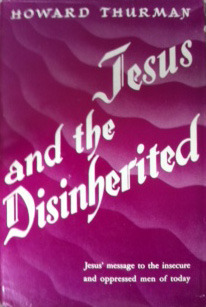 W
WJesus and the Disinherited is a 1949 book by African-American minister, theologian, and civil rights leader Howard Thurman.
 W
WJesus for President: Politics for Ordinary Radicals is a 2008 book co-written by the evangelical authors Shane Claiborne and Chris Haw, two important figures in New Monasticism. The book asserts that the countercultural themes in the ministry of Jesus, such as those of self-denial, are ignored by American Christians because they have become accustomed to exercising Christian privilege and are unwilling to give it up.
 W
WJesus: A Portrait is a 2008 Christological book by the Australian Jesuit priest and academic Gerald O'Collins.
 W
WThe Kingdom of God Is Within You is a non-fiction book written by Leo Tolstoy. A philosophical treatise, the book was first published in Germany in 1894 after being banned in his home country of Russia. It is the culmination of 30 years of Tolstoy's thinking, and lays out a new organization for society based on an interpretation of Christianity focusing on universal love.
 W
WLet Me Be a Woman: Notes to My Daughter on the Meaning of Womanhood is a 1976 book by Elisabeth Elliot that was published by Tyndale House in Wheaton, Illinois, United States. The book is 185 pages long and is about what is written about women in the Bible. The book also provides advice about marriage. Elliot gave the book to Valerie, her only child, as a gift on the day of her wedding. Elliot used the phrase "Let me be a woman" in response to Christian egalitarianism, which she said was "not a goal to be desired [because] it is a dehumanizing distortion." Her use of the phrase in this manner in 1977 at the National Women's Conference in Houston, Texas evoked considerable applause. The book contains several stories, the first of which telling about how God brought two people together from across the world into a romantic relationship with each other because of their obedience to God's leading. Another story is about the murder of John and Betty Stam, Christian martyrs. A prayer by Betty Stam is also included in the book. The prayer asks that the full will of God be done in her life, irrespective of the cost to herself. In 2003, Andrew Farmer of Crosswalk.com quoted a portion of the book in support of his argument that singleness is a spiritual gift that God gives to single people for the period in which they are single.
 W
WThe Collectanea, or Magna glossatura as it came to be known, is a collection of commentaries on the Psalms and the Pauline Epistles written by Peter the Lombard between 1139 and 1141.
 W
WMelting the Venusberg: A Feminist Theology of Music is a 2004 book by Heidi Epstein, in which the author provides a critique of the foundations of the understanding of Western music. She argues that this understanding has reinforced social prejudices, particularly those against women and this is more evident in religious music.
 W
WMoral Man and Immoral Society: A Study in Ethics and Politics is a 1932 book by Reinhold Niebuhr, an American Protestant theologian at Union Theological Seminary (UTS) in New York City. The thesis of the book is that people are more likely to sin as members of groups than as individuals. Niebuhr wrote the book in a single summer. He drew the book's contents from his experiences as a pastor in Detroit, Michigan prior to his professorship at UTS. The book attacks liberalism, both secular and religious, and is particularly critical of John Dewey and the Social Gospel. Moral Man and Immoral Society generated much controversy and raised Niebuhr's public profile significantly. Initial reception of the book by liberal Christian critics was negative, but its reputation soon improved as the rise of fascism throughout the 1930s was seen as having been predicted in the book. Soon after the book's publication, Paul Lehmann gave a copy to Dietrich Bonhoeffer, who read it and was impressed by the book's thesis but disliked the book's critique of pacifism. The book eventually gained significant readership among American Jews because, after a period of considerable anti-theological sentiment among Jews in the United States, many Jews began to return to the study of theology and, having no Jewish works of theology to read, turned to Protestant theological works.
 W
WThe Myth of Pelagianism (2018) is a book by Ali Bonner which asserts that the Christian heresy known as Pelagianism was a "deliberately invented fiction" of its opponent Augustine, rather than an actual doctrine promoted by Pelagius. Bonner also asserts that Pelagius' actual positions were mainstream in contemporary Christianity. The book is based on Bonner's doctoral and postdoctoral research and was published by Oxford University Press. It received mixed reviews; some reviewers were not convinced by Bonner's arguments.
 W
WGeorge Arthur Lindbeck (1923–2018) was an American Lutheran theologian. He was best known as an ecumenicist and as one of the fathers of postliberal theology.
 W
WA New Christianity for a New World: Why Traditional Faith Is Dying and How a New Faith Is Being Born is a theological book by Episcopalian bishop John Shelby Spong, published in 2001, in which he outlines his ideas for doctrinal changes within Christianity in the modern world.
 W
WOn the Trinity is a Latin book written by Augustine of Hippo to discuss the Trinity in context of the logos. Although not as well known as some of his other works, it is arguably his masterpiece and of more doctrinal importance than the Confessions or City of God.
 W
WOriginal Sin: Illuminating the Riddle is a short theological monograph based on Lectures given by Henri Blocher in 1995 at Moore Theological College in Sydney, Australia. It articulates the major contours of the Christian doctrine of original sin. D. A. Carson, a theologian from Trinity Evangelical Divinity School, writes that Blocher "is able to think through the interlocking contributions of historical theology, biblical theology and systematic theology, and come to fresh conclusions in the light of Scripture, without overturning all that is valuable from the past."
 W
WReaching for the Invisible God: What Can We Expect to Find? is a book written by the evangelical writer Philip Yancey and published by Zondervan in September 2000. The popularity of Yancey's 1997 book What's So Amazing About Grace? helped boost the sales of Reaching for the Invisible God to the point that it appeared on religion bestseller lists immediately upon publication. Within a month, Zondervan reported sales of 94,000 copies. While preparing to write the book, Yancey asked several people how they knew that their trust in Jesus had changed their lives, and one Christian radio host responded, "I have no trouble believing God is good. My question is more, what good is he? ... I cry out to God for help, and it's hard to know just how he answers". Reaching for the Invisible God includes discussion of Yancey's bad experiences of growing up in a very judgmental church, a theme that he had previously discussed in The Jesus I Never Knew and What's So Amazing About Grace? and later returned to in Soul Survivor. In November 2000, Reaching for the Invisible God became the first print book to be released as an e-book by Zondervan, appearing on Microsoft Reader.
 W
WSaving Your Marriage Before It Starts: Seven Questions to Ask Before You Marry is a 1995 book by Leslie and Les Parrott, a married couple. The two have collaboratively written other books as well, including Becoming Soul Mates and The Marriage Mentor Manual. Saving Your Marriage Before It Starts is a Christian non-fiction book that focuses on premarital issues. The book comprehensively explains how to be prepared for marriage. Video lessons were included with the publication of the book. In the book, the Parrotts argue that people should seek self-realization individually and cannot expect their spouses to bring about that change in them. They also recommend complimenting one's spouse at least daily. In the book The Family, Jack and Judith Balswick recommended Saving Your Marriage Before It Starts to couples preparing for marriage. Adriana Barton of The Globe and Mail called the Parrotts' book "anodyne."
 W
WThe Four Books of Sentences is a book of theology written by Peter Lombard in the 12th century. It is a systematic compilation of theology, written around 1150; it derives its name from the sententiae or authoritative statements on biblical passages that it gathered together.
 W
WStudia evangelica is book containing a series of papers presented to the International Congress held at Christ Church, Oxford, 1957. The Congress followed immediately on the annual gathering of the Studiorum Novi Testamenti Societas which had met at Birmingham. The full title is: Studia evangelica: papers presented to the International Congress on “The Four Gospels in 1957” held at Christ Church, Oxford, 1957. This was followed by six more volumes containg papers presented at subsequent congresses. the last being published in 1982. All were in the series "Texte und Untersuchungen zur Geschichte der altchristlichen Literatur"; Bd. 73, 87, 88, 102, 103, 112 & 126.
 W
WThe Summa Theologiae, as the best-known work of Thomas Aquinas, is a compendium of all of the main theological teachings of the Catholic Church, intended to be an instructional guide for theology students, including seminarians and the literate laity. Presenting the reasoning for almost all points of Christian theology in the West, topics of the Summa follow the following cycle: God; Creation, Man; Man's purpose; Christ; the Sacraments; and back to God.
 W
WTheology from the Womb of Asia is a non-fiction theology book written by Choan Seng Song in 1986 and published in New York. The book examines the nature of Christian theology as interpreted in Asia.
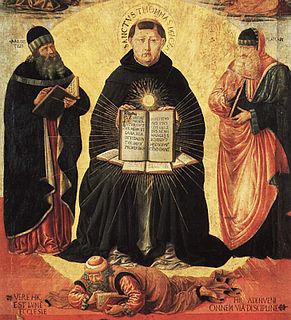 W
WTreatise on Law is Thomas Aquinas' major work of legal philosophy. It forms questions 90–108 of the Prima Secundæ of the Summa Theologiæ, Aquinas' masterwork of Scholastic philosophical theology. Along with Aristotelianism, it forms the basis for the legal theory of Catholic canon law.
 W
WTreatise on Relics or Tract on Relics is a theological book by John Calvin, written in 1543 in French about the authenticity of many Christian relics. Calvin harshly criticizes the relics' authenticity, and suggests the rejection of relic worship. The book was published in Geneva, and was included in the Index Librorum Prohibitorum.
 W
WThe Virgin Mary: The Roman Catholic Marian Doctrine is the English title of Italian Protestant theologian Giovanni Miegge's 1950 work La vergine Maria: Saggio di storia del dogma. In the original Italian language it has gone through four printings, the most recent in 2008.
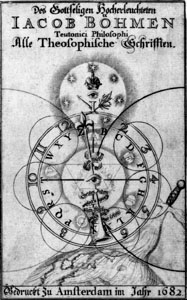 W
WThe Way to Divine Knowledge was written by William Law (1686-1761) as preparatory to a new edition of the Works of Jacob Behmen and the “Right Use of Them”. The first edition of The Way to Divine Knowledge was printed in 1752 by the London printer and novelist Samuel Richardson, who very much admired William Law and had been involved in printing Law’s earlier books. It was published in London by the distinguished booksellers William Innys and John Richardson. It was preceded by The Spirit of Prayer and followed by The Spirit of Love.
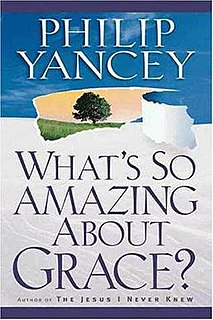 W
WWhat's So Amazing About Grace? is a 1997 book by Philip Yancey, an American journalist and editor-at-large for Christianity Today. The book examines grace in Christianity, contending that people crave grace and that it is central to the gospel, but that many local churches ignore grace and instead seek to exterminate immorality. What's So Amazing About Grace? includes Bible stories, anecdotes from Yancey's life, accounts of historical events and other stories. These include a modern retelling of the Parable of the Prodigal Son, an account of Yancey's friendship with Mel White who came out as homosexual, a comparison of the teachings of early Christians Pelagius and Augustine of Hippo, and a summary of Karen Blixen's short story "Babette's Feast".
 W
WWhen God Writes Your Love Story: The Ultimate Approach to Guy/Girl Relationships is a 1999 book by Eric and Leslie Ludy, an American married couple. After becoming a bestseller on the Christian book market, the book was republished in 2004 and then revised and expanded in 2009. It tells the story of the authors' first meeting, courtship, and marriage. The authors advise single people not to be physically or emotionally intimate with others, but to wait for the spouse that God has planned for them. The first edition was packaged with a CD single by the Ludys: "Faithfully", a song they had written specifically to accompany the book.